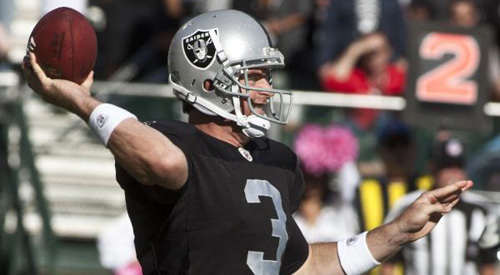
Palmer’s homecoming shows Raiders’ win-now philosophy
Carson Palmer is back in the state where he made his name. The Fresno, California native and USC legend was recently dealt from the Cincinnati Bengals to the Oakland Raiders for a first-round and conditional second-round pick, demonstrating how desperate the Raiders are to find success. However, his homecoming hasn’t been a happy one so far, and his return may handicap the team for the future if things don’t improve.
There is no questioning Palmer’s skill. He won the Heisman Trophy as a senior at Southern Cal, was taken first overall in the NFL Draft, has been to two Pro Bowls, took Cincinnati to the playoffs twice, and holds 10 Bengals franchise passing records.
But still, is he worth what Oakland gave up?
Before this season, Palmer demanded to be traded. When he wasn’t, he “retired.” The Bengals moved on, drafting TCU’s Andy Dalton, a rookie who has led Cincinnati to a 4-2 record, tied with Baltimore and behind only Pittsburgh in the AFC North. All the while, Palmer missed out on training camps, the preseason, and all regular season action. He seemed content to live without football.
Is this a player that a franchise really wants under center? Is bringing him on board in Oakland really worth the cost for the Raiders? He is immensely talented, for sure, but he is also a player who would rather sit out the season than continue playing for a struggling team.
Giving up one guaranteed first-rounder and possibly another for a player with those kinds of character and commitment questions shows just how desperate the Raiders are to win now. Oakland went 8-8 last season, their first .500 season since 2002, and the future looked bright with Jason Campbell at quarterback and talented, young players on both sides of the ball. The team went 6-0 against division opponents as well. To some, 2011 was looking like the year for the Raiders to make their return to the top of the AFC West.
[php snippet=1]
And then Campbell went down. On October 16 against the Cleveland Browns, Campbell broke his collarbone, ending his season. Oakland held on to win that game and improve to 4-2, right behind San Diego for first on the AFC West, but the future looked grim.
With a team built to win now, Raiders management had a tough decision to make: should they trust one of the backups already on the roster or bring in a new quarterback?
Obviously, Oakland went with the second option, not trusting Kyle Boller to handle the job.
Just two days after Campbell’s injury, a deal was completed to bring Palmer to the West Coast. With just five days as a Raider before Oakland’s next game, and the amount of time Palmer had spent away from the game, no one expected him to start on Sunday against Kansas City, which he didn’t. However, Boller struggled mightily, throwing two interceptions in his first three passes, including one that was returned for a touchdown. A third interception and general inefficiency finally forced the hand of coach Hue Jackson, and Palmer did make his debut this past Sunday.
He promptly threw three interceptions, including one returned for a score, as Oakland lost 28-0 behind a largely ineffectual offense.
Still, a game like that can be easily written off as Palmer shaking off the rust while getting used to a new team and a new system.
Despite that less-than-stellar performance, hopes are still high for many Raider fans. After all, this is the same franchise that has a history of reversing the career fortunes of players the rest of the league has given up on. If the Raiders of the past won two Super Bowls with an aging Jim Plunkett under center, why can’t the Raiders of the present win with a younger, more talented player in Carson Palmer?
While optimistic Raider fans may think that way, there is reason for tempered expectations. While the team did perform well last season and early on in 2011, almost a decade of futility preceded that success, a decade filled with horrible personnel moves and a revolving door of head coaches.
So which mold does this Oakland team fit? Early success and a dominant ground game harken back to the glory years, and while they may have given up too much for Palmer, the move shows a commitment to maintaining Al Davis’ famed philosophy of “Just Win, Baby.”
It will be one of the more interesting stories of this NFL season, to see if Palmer and the Raiders can do just that, or whether they will continue the trend of mediocre Oakland teams of recent vintage – and whether they’ll have sacrificed their future in a failed attempt to win now.
[php snippet=1]

